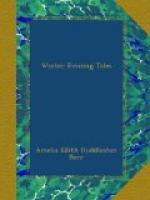At the inquest which followed, her stern old father neither blamed nor excused himself. He accepted without apology the verdict of society against him; only remarking that its reproof was “a guid example o’ Satan correcting sin.”
Scant pity and less ceremony was given to her burial. Death, which draws under the mantle of Charity the pride, cruelty and ambition of men, covering them with those two narrow words Hic jacet! gives also to the woman who has been a sinner all she asks—oblivion. In no other way can she obtain from man toleration. The example of the whitest, purest soul that ever breathed on earth, in this respect, is ignored in the church He founded. The tenderest of human hearts, “when lovely woman stooped to folly,” found no way of escape for her but to “die;” and those closet moralists, with filthy fancies and soiled souls, who abound in every community, regard her with that sort of scorn which a Turk expresses when he says “Dog of a Christian.” Poor Lettice! She had procured this doom—first by sacrificing herself to a blind and cruel love, and then to the importunate demands of hunger, “oldest and strongest of passions.” Ah! if there was no pity in Heaven, no justice beyond the grave, what a cruel irony this life would be! For, while the sexton shoveled hastily over the rude coffin the obliterating earth, there passed the graveyard another woman equally fallen from all the apostle calls “lovely and of good report.” One whose youth and hopes and marvelous beauty had been sold for houses and lands and a few thousand pounds a year. But, though her life was a living lie, the world praised her, because she “had done well unto herself.” Yet, at the last end, the same seed brought forth the same fruit, and the Lady of Hawksworth Hall learned, with bitter rapidity, that riches are too poor to buy love. Scarcely had she taken possession of her splendid home before she longed for the placid happiness of her mother’s cottage, and those evening walks under the beech-trees, whose very memory was now a sin. Over her beautiful face there crept a pathetic shadow, which irritated the rude and noisy squire like a reproach. He had always had what he wanted. Not even the beauty of all the border counties had been beyond his means to buy but somehow he felt as if in this bargain he had been overreached. Her better part eluded his possession, and he felt dissatisfied and angry. Expostulations grew into cruel words; cruel words came to cruder blows. Yes, blows. English gentlemen thirty years ago knew their privileges; and that was one of them. She was as much and as lawfully his as the horses in his stables or the hounds in his kennels. He beat them, too, when they did not obey him. Her beauty had betrayed her into the hands of misery. She had wedded it, and there was no escape for her. One day, when her despair and suffering was very great, some tempting devil brought her a glass of brandy, and she drank it. It gave her back for a few hours




